Republicans Tell Blinken Not To Sign A Deal With Iran Brokered By Russia
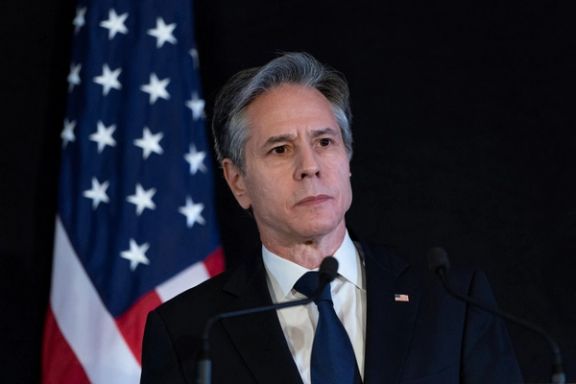
US House Republicans have written a letter to Secretary of State Antony Blinken calling for Washington to abandon the Vienna nuclear talks with Iran.

US House Republicans have written a letter to Secretary of State Antony Blinken calling for Washington to abandon the Vienna nuclear talks with Iran.
House Republican Leader Kevin McCarthy and House Foreign Affairs Committee Lead Republican Michael McCaul published the letter to Blinken on Saturday, saying “We are alarmed that the Biden Administration may be preparing to evade the clear requirements of the law by pretending that a new deal is somehow a ‘continuation of’ or ‘return to’ the Joint Comprehensive Plan of Action (JCPOA) that was submitted to Congress back in 2015.”
“That would be an absurd and lawless claim. Any deal the Administration concludes cannot be a return to the original JCPOA. The United States withdrew from the JCPOA in May 2018”, they said.
They expressed urgent concern that “the Administration is working through Russian intermediaries to finalize an Iran nuclear deal without submitting it for Congressional consideration, as required by law”.
The lawmakers said the agreement would hand tens of billions of dollars to “the world’s largest state sponsor of terrorism” and remove sanctionson “terrorists with blood on their hands”, which would require Congressional review.
Republicans have consistently opposed President Joe Biden’s policy of reviving the JCPOA and lifting sanctions imposed by former president Donald Trump.
They said Iran has violated JCPOA limitations in numerous cases, including producing equipment for advanced centrifuges and stockpiling uranium enriched at 20% and 60% purity, noting such violations make it impossible to simply “return” to the 2015 deal.
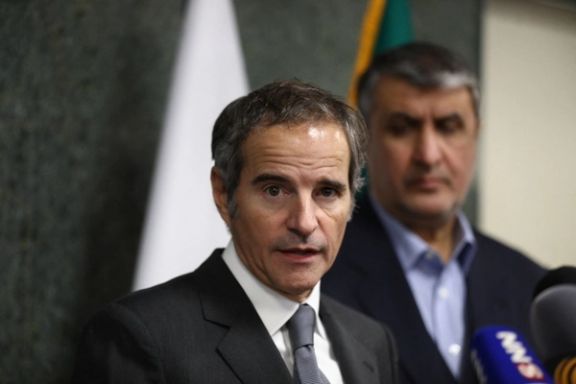
Saturday’s statement from Iran’s atomic chief and the UN nuclear watchdog head seems to have cleared an obstacle in the way of renewing the 2015 nuclear deal.
Rafael Mariano Gross, head of the International Atomic Energy Agency, and Mohammad Eslami, head of the Atomic Energy Organization of Iran, expressed agreement that Iran would by March 21 provide written answers to the agency over “outstanding issues” in Iran’s nuclear program.
But Grossi made it clear that the implementation of a new nuclear agreement would depend on Iran's satisfactory cooperation with IAEA>
There had been reports over the past week that Tehran’s failure to satisfy the IAEA over the issues relating to secret nuclear work carried out before 2003 – might derail talks in Vienna aimed at reviving the 2015 Iran nuclear deal, the JCPOA (Joint Comprehensive Plan of Action). There had been speculation that Iran had demanded as a condition for agreement in Vienna that the IAEA drop these enquiries.
But with many participants saying talks are at a closing stage, the timeline agreed in Tehran Saturday by Grossi and Eslami − whatever informal understandings the two may have reached − suggests JCPOA restoration does not depend on the agency first being satisfied with Iran over the “outstanding issues.”
Written Explanations
The Grossi-Eslami statement agreement stipulates that once Iran provides “written explanations including related supporting documents” by March 21, there would be two weeks for the IAEA to raise questions, and another week for Iran to answer them before further meetings between the IAEA and the AEOI.
Grossi would then report to the IAEA board by June – which presumably explains Eslami’s reference to June made earlier in the day.
Sitting next to Grossi at the Tehran news conference Saturday, Eslami said, according to Reuters, that Iran would resolve “outstanding matters,” and that “we have agreed to provide the IAEA by the end of Khordad [the Iranian month ending June 21] with documents related to outstanding questions between Tehran and the agency.”
While the IAEA would monitor a restored JCPOA – with greater powers of inspections – the agency is not directly involved in the Vienna talks. Its enquiries into Tehran’s pre-2003 nuclear work are part of monitoring Iran’s atomic program under the ‘safeguards’ requirements of the Nuclear Non-Proliferation treaty.
‘Very important safeguards’
But while Iran has said the IAEA’s probe into “outstanding issues” resulted from political pressure, especially from the United States, its failure to satisfy the agency has cast a shadow over the Vienna talks and threatened to complicate the challenges in reviving the JCPOA.
"My impression is that it would be difficult to imagine you can have a cooperative relationship as if nothing had happened if the clarification of very important safeguards were to fail," Grossi told the press conference in Tehran when asked directly how the matter could affect the Vienna talks.
While diplomats in Vienna have said the negotiations have edged nearer agreement, there have been sticking-points in agreeing exactly which US sanctions contravene the JCPOA and exactly how Tehran’s refined and expanded nuclear program might be brought back within JCPOA limits. A further complication came Saturday when Sergei Lavrov, Russia’s foreign minister, suggested Moscow needed assurances that international sanctions over Ukraine would not hamper Russia’s links with Iran, including its co-operation in implementing a restored JCPOA.
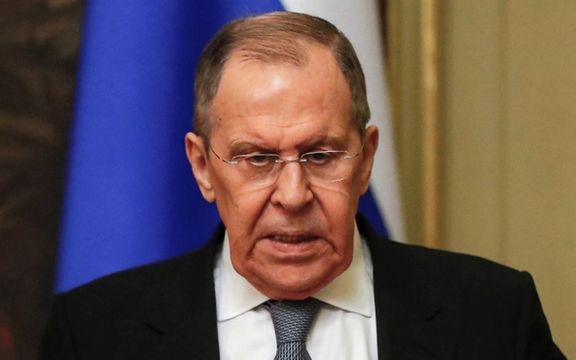
Russian foreign minister's demand for guarantees from the US that sanctions over Ukraine would not affect its relations with Iran has outraged many in Iran.
Russian Foreign Minister Sergei Lavrov said Saturday that international sanctions against Russia over Ukraine could create "problems from the point of view of Russia's interests" in its dealings with Iran. Moscow is expected to play a central role in implementing a renewed JCPOA, especially in removing Iran’s excess stocks of enriched uranium.
Lavrov has asked for guarantees from the US, at the minimum level of Secretary of State, that US sanctions over Ukraine would not affect Russia's "right to free, fully-fledged trade and economic and investment cooperation and military-technical cooperation with Iran” under the terms of the JCPOA.
‘Putin’s grenade’
Several conservative websites -- which unlike the state-run and hardliner media have reported Lavrov's remarks -- chose headlines that clearly indicated outrage.
These websites saw the Russian move not as an attempt to protect the JCPOA from US sanctions against Russia but as a conspiracy. Entekhab ran the headline "Putin's Grenade Under Negotiation Table For Restoration of JCPOA." Tabnak demanded to know “whether Russia's demand for written guarantee from the US is creating impediments in the process of [Vienna] talks or not…”
Aftab News ran a commentary headlined "Russia's War on Ukraine and Blackmail in Vienna, Is Putin Shooting At JCPOA?" and demanded an immediate Iranian response. Not to be outdone, the reformist Etemad newspaper's website ran the headline "Russia Pour Out Its Poison, Moscow Ties Nuclear Deal To Ukraine War."
Ali Naderi, managing-director of the official news agency IRNA, advising calm, tweeted Saturday afternoon that China was at one with Moscow in asking “for valid written guarantees from the US regarding future economic relations with Iran.”
Carving a huge hole
Wall Street Journal, which last month in an editorial criticized any talk of “sanctions relief [for Iran] even before an accord is struck,” cited a “western diplomat” Saturday that Lavrov might be “using this as a play to try to carve a huge hole out of the overall Ukraine sanctions.” This would be “a different story,” the diplomat suggested, from guarantees simply over work directly linked to a restored JCPOA.
Reuters on Saturday cited a “senior Iranian official” making a cool response to Lavrov’s remarks and calling Russian moves "not constructive" for the Vienna talks. "Russians had put this demand on table since two days ago,” the official said. “There is an understanding that by changing its position in Vienna talks Russia wants to secure its interests in other places.”
On social media, conspiracies past and present abounded. Some twitterati dredged up the notion that former Foreign Minister Mohammad Javad Zarif had in March 2021 accused Russia of somehow trying todestroy the 2015 deal by using Iranian ground troops in the Syrian war.
Moscow has publicly supported the JCPOA and has called on both Washington and Tehran to abide by it. Diplomats in Vienna had, at least until now, stressed the importance of isolating the Iran nuclear program from other issues.
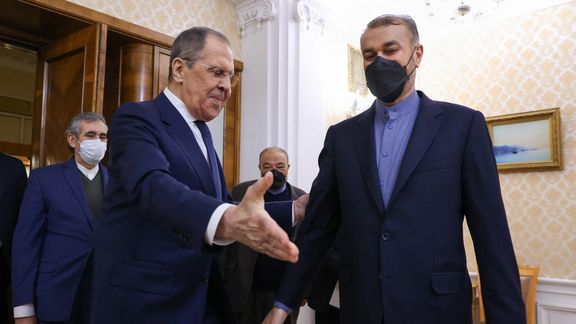
Russia has demanded guarantees from the US that sanctions over Ukraine would not affect its links with Iran, further complicating Iran's ongoing nuclear talks.
Foreign Minister Sergei Lavrov said international sanctions against Russia had created a “problem” for the Vienna nuclear talks aimed at reviving the 2015 Iran nuclear deal, the JCPOA (Joint Comprehensive Plan of Action).
With the talks in Vienna at a critical stage, it is widely assumed Russia would play a central role in implementing a revived JCPOA, including shipping out enriched uranium currently held by Iran in excess of JCPOA limits.
Reuters cited a “senior Iranian official” making a cool response to Lavrov’s remarks, calling Russian moves "not constructive" for the Vienna talks. "Russians had put this demand on table since two days ago,” the official said. “There is an understanding that by changing its position in Vienna talks Russia wants to secure its interests in other places.”
Iran said on Saturday it had agreed a roadmap with the UN nuclear watchdog to resolve all “outstanding questions” about the country's nuclear program by June 21, seen as a push to reach agreement global powers in Vienna.
For a week, analysts have been speculating whether the Ukraine crisis might have an impact on the Vienna talks. Lavrov’s statement suggests the two cannot be kept entirely separate.
Avalanche of sanctions
"It would have all been fine, but that avalanche of aggressive sanctions that have erupted from the West − and which I understand has not yet stopped − demand additional understanding by lawyers above all," the veteran Russian foreign minister said. "We want an answer − a very clear answer − we need a guarantee that these sanctions will not in any way touch the regime of trade-economic and investment relations which is laid down in the Joint Comprehensive Plan of Action."
Under a revived JCPOA, Lavrov said, Russia and China would be able to help Iran develop its civilian nuclear programs in line with non-proliferation rules, and should be free to do so without the threat of sanctions.
Russia has long been an ally of the Islamic Republic and their military's have been fighting shoulder-to-shoulder in Syria to protect president Bashar al-Assad's rule.
"There are still several topics which our Iranian colleagues want more clarity on and we consider those are fair demands," he said. "We have asked for a written guarantee ... that the current process triggered by the United States [in sanctioning Russia] does not in any way damage our right to free and full trade, economic and investment cooperation and military-technical cooperation with the Islamic Republic."
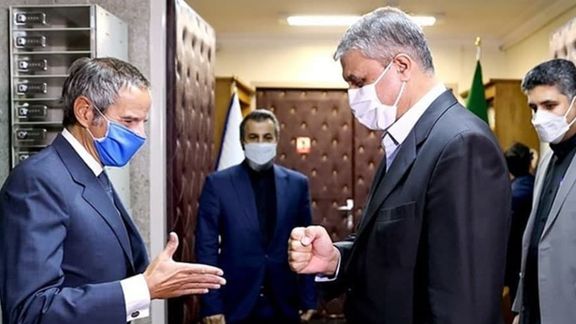
IAEA head Rafael Grossi met Iran’s nuclear chief Saturday morning during his trip to Tehran to resolve safeguards issues that could impact a new nuclear deal.
Iran’s nuclear head Mohammad Eslami Iran would resolve “outstanding matters” by June 21 with the UN atomic watchdog. It was unclear if the watchdog chief backed the timeline.
Eslami announced the timeframe in Tehran at a press conference alongside Rafael Mariano Grossi, visiting chief of the United Nations’ International Atomic Energy Agency.
It was unclear how the three-month timetable would fit with nuclear talks between Tehran and world powers in Vienna, where many participants over the past week have stressed that efforts to revive the 2015 Iran nuclear deal are reaching a conclusion.
"We have agreed to provide the IAEA by the end of [the Iranian month of] Khordad [June 21] with documents related to outstanding questions between Tehran and the agency," Eslami told the news conference, which was televised in Iran.
"It is important to have this understanding ... to work together, to work very intensively," Grossi said. But the IAEA chief, who was due to return to Vienna Saturday, added: "There are still matters that need to be addressed by Iran."
Complex interplay
The interplay between the Vienna talks and the IAEA role is a complex one. As a signatory of the Nuclear Non-Proliferation treaty (NPT), Iran is subject to IAEA inspections and monitoring under its NPT ‘safeguards’ agreement.
But the agency’s role was enhanced under the 2015 deal, the JCPOA (Joint Comprehensive Plan of Action), which limited Iran’s nuclear program in scale and nature. Since 2019, a year after the United States left the JCPOA and began ‘maximum pressure’ sanctions, Iran has both expanded its nuclear program and limited IAEA access almost to the lower level required under safeguards.
But in addition to negotiating a temporary arrangement to maintain access beyond safeguards, Grossi has continued to request information on Iran’s nuclear work prior to 2003, including the agency’s finding of uranium traces it says are unexplained. This IAEA line of enquiry comes under safeguards.
It was reported over the past week that Iran had demanded in Vienna, as part of an agreement over reviving the JCPOA, that this IAEA enquiry be dropped. But in Tehran, Grossi appeared to suggest Saturday that it might be other parties to the talks – presumably the United States or the three western European JCPOA signatories – who were insisting the probe continues.
Resolving ‘outstanding issues’
"Without resolving these (outstanding) issues, efforts to revive the JCPOA (the Joint Comprehensive Plan of Action) may not be possible,” Grossi told Saturday’s press conference. The IAEA chief did not explain whether these ‘outstanding issues’ might be long-standing questions, future agency work in monitoring the reimplementation of the JCPOA, or both.
Aside from any issues directly within the IAEA remit, the Vienna talks have faced challenges in agreeing which US sanctions contravene the JCPOA and exactly how the refined and expanded Iranian nuclear program should be brought back within JCPOA limits.

Iranian lawmakers appear to be not equally informed about Tehran's nuclear negotiations with world powers aimed at restoring the 2015 agreement known as JCPOA.
While one lawmaker was certain that "Iran has reached an agreement better than before with the United States," another member of the Iranian parliament says that the Majles has been kept in the dark about the negotiations in Vienna.
Another Iranian lawmaker was quoted by local media as saying that he is less concerned about the initiatives and positions of the other side than about the plots being hatched by regime insiders in Iran to derail the negotiations.
Hardliner lawmaker Hossein Naghavi-Hosseini told Nameh News in Tehran that he is certain the negotiations will bear fruit and an agreement is at hand, although there are still issues that have not been tackled by the negotiators.
Naghavi-Hosseini said that Iran will announce its final verdict on the deal within a few days. He said Iran is adamant to reach a deal, adding that everything has been agreed upon except the guarantees that Iran demands that the next US President will not pull out of the nuclear agreement with Iran.
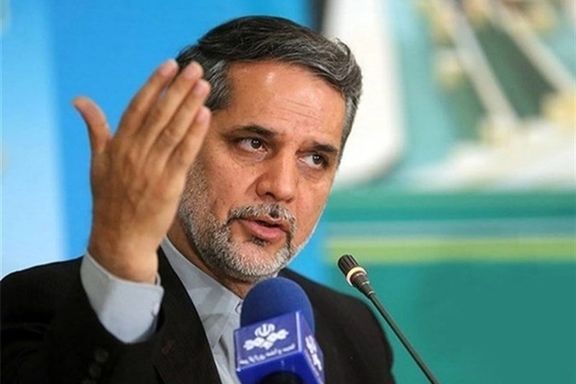
The hardliner lawmaker went on to say that the two sides have agreed all the sanctions imposed on Iran after President Donald Trump's pull-out from the JCPOA in 2018 will be lifted. What Iran and America have agreed upon is not much different from the JCPOA, he said and explained that Westerners are concerned about Iran's ability to enrich uranium beyond the 60-percent level.
Although Naghavi-Hosseini appeared or claimed to be well-informed about the deal, his colleague Jabbar Kouchakinejad told reporters on Thursday that the parliament has not been informed of the government's views about the talks. He also said that there are still problems about the impact of US sanctions on Iran's economy, insurance and oil industry and international trade which have not been resolved.
Kouchakinejad said there are a lot of ambiguities about a possible deal with America as Majles Speaker Mohammad Bagher Ghalibaf has offered minimal explanations to lawmakers. He added that it is important for the Majles to make sure that any possible agreement does not undermine previous laws passed by the Majles.
Kouchakinejad added that the Majles is also concerned that problems in the United States' domestic politics could prompt any US government to withdraw from a deal with Iran. That is why Iran insists on getting guarantees from the US side, although so far Washington has refused to give any such guarantee.
Meanwhile, he said that as far as safeguard regulations of the JCPOA are concerned, Iran has red lines that cannot allow IAEA inspectors to visit some of its nuclear sites.
At the same time, former Iranian lawmaker Jalal Mirzaee told Asr-e Ma in Tehran that some political elements in Tehran are pushing hard to derail the nuclear talks. Mirzaee, a professor of political science, said that he is more concerned about the adverse impact of these moves than he is concerned about the decisions being made in other capitals.
He said moves opposing an agreement have intensified following the Russian invasion of Ukraine. He warned that such moves which are motivated by factional interests have led to wasting of a lot of time and opportunities for Iran and could lead to further costs. "We should seize the opportunity and relieve the country of its tremendous financial difficulties while President Biden urgently needs a deal with Iran," Mirzaee said.